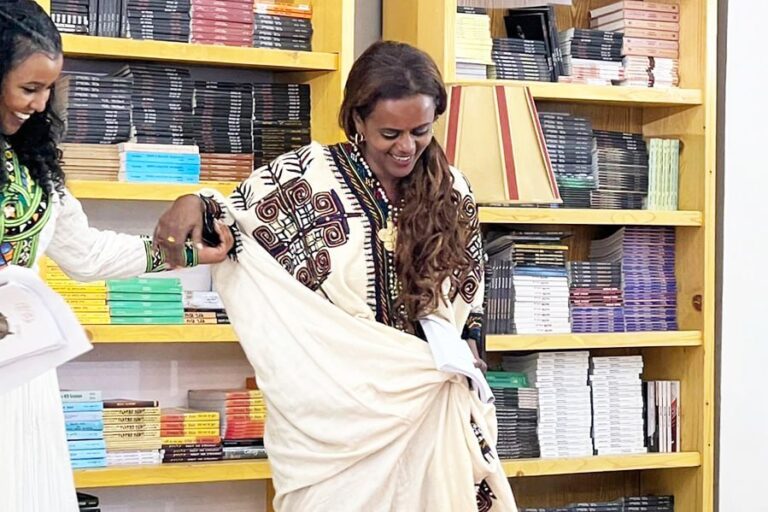As Ethiopia navigates complex debt restructuring negotiations, China stands out as a principal player, deeply embedded in the nation’s development trajectory. Over the past decade, China has cemented its position as a leading bilateral financier through its ambitious Belt and Road Initiative (BRI) and the Forum on China-Africa Cooperation (FOCAC). These frameworks have channeled significant investment into Africa, with Ethiopia emerging as a central partner.
Launched in 2013, the BRI aims to enhance global connectivity through infrastructure and trade, and Ethiopia has seen considerable benefits from this initiative. Meanwhile, the FOCAC has further bolstered China-Africa ties, with expectations of new financial commitments at the upcoming summit in Beijing next month.
In this exclusive interview, Charge d’Affaires ad interim Shen Qinmin and Minister Counsellor Yang Yihang of the Chinese Embassy address key questions about the impact of these initiatives on Ethiopia’s economy, the implications of recent policy changes from China’s 3rd Plenary Session of the 20th CPC Central Committee, and the future direction of BRI projects in Ethiopia. The discussion also tackles concerns regarding debt sustainability and environmental impacts, shedding light on China’s strategies for supporting Ethiopia’s development while fostering stronger bilateral relations.
Join us as we explore the nuances of China-Ethiopia cooperation and what lies ahead for one of Africa’s most pivotal partnerships. Excerpts
Capital: Do you believe the Belt and Road Initiative’s (BRI) objectives of boosting Ethiopia’s GDP have been realized in this initial decade? If so, what do you think are the major indicators of this success?

Belt and Road Initiative was proposed by Chinese President Xi Jinping in 2013. The initiative aims to enhance policy, infrastructure, trade, financial and people-to-people connectivity, inject new impetus into the global economy, create new opportunities for global development, and build a new platform for international economic cooperation. More than 150 countries and over 30 international organizations have signed Belt and Road cooperation documents, among which Ethiopia is one of the pivotal regional partners. We have established over 20 specialized multilateral cooperation platforms under the BRI.
Last October, the 3rd Belt and Road Forum for International Cooperation was held in Beijing, where President Xi proposed that China will promote both signature projects and “small yet smart” livelihood programs. The China Development Bank (CDB) and the Export-Import Bank of China (CEXIM) will each set up a RMB 350 billion financing window. An additional RMB 80 billion will be injected into the Silk Road Fund. Together, they will support BRI projects on the basis of market and business operation. Cooperation agreements worth USD 97.2 billion have been concluded at the CEO Conference held during this Forum. China will carry out 1,000 small-scale livelihood assistance projects, and enhance vocational education cooperation through Luban Workshops and other initiatives. We will also step up joint efforts to ensure the safety of BRI projects and personnel.
So far, the high-quality Belt and Road cooperation has become an internationally popular public good for the building of a community with a shared future for mankind, a core tenet of Xi Jinping Thought on Diplomacy. In such a community, all of us live in an open, inclusive, clean and beautiful world of lasting peace, universal security and shared prosperity. To this end, we are ready to join hands with our Ethiopian friends to make our bilateral cooperation even better and closer in pursuit of common development.

Capital: Recently, the 3rd Plenary Session of the 20th Central Committee of the Communist Party of China (CPC) just concluded in Beijing, drawing great international attention. China’s further reform and high-standard opening up was a central topic in this session. What impacts will the 3rd Plenary Session bring to the BRI cooperation?
At the 3rd Plenary Session of the 20th CPC Central Committee just concluded the other day, Resolution of CPC Central Committee on Further Deepening Reform Comprehensively to Advance Chinese Modernization outlines plans for refining the institutions and mechanisms for high-standard opening up, which involve steadily expanding institutional opening up, deepening the foreign trade structural reform, further reforming the management systems for inward and outward investment, optimizing the layout for regional opening up, and improving the mechanisms for high-quality cooperation under the BRI. We have every reason to believe that China’s further reform and high-standard towards Chinese modernization will unleash greater potential in the BRI cooperation between our two countries.

Capital: The BRI encompasses various focus areas, including road, rail, maritime infrastructures, and digital networking. In the context of Ethiopia, which of these areas have been given priority during the first decade of the initiative? Looking ahead, which areas do you anticipate will be the focus for the second decade of implementation?
Over the first “golden decade” of the BRI cooperation, China and Ethiopia focused on the traditional infrastructure construction such as railways, highways, urban light rail, urban power grids and municipal water supply systems. The well-known Ethiopia-Djibouti Railway is a flagship project of China-Ethiopia BRI cooperation. The Chinese side has fulfilled its operation and maintenance contract and has been fully handed it over to the Ethiopian side. At present, we have ushered in a new era for the operation and development of the Railway, a project that has made positive contributions to Ethiopia’s economic and social development and national modernization.
Looking ahead to the next decade, China and Ethiopia will deepen cooperation in traditional infrastructure as well as in new-type infrastructure under the BRI framework, such as the new generation of mobile networks and renewable energy power generation. Both sides are expected to expand BRI cooperation from physical connectivity to institutional connectivity. Important guiding principles for high-quality Belt and Road cooperation have been laid down, which include the principle of “planning together, building together, and benefiting together,” the philosophy of open, green and clean cooperation, and the goal of pursuing high-standard, people-centered and sustainable cooperation.

Capital: Do you believe that the BRI infrastructure projects have improved network connectivity and trade between Ethiopia and its neighboring countries? If so, can you provide specific examples or evidence of these improvements?
Of course. As a flagship project of BRI cooperation jointly built by China, Ethiopia and Djibouti, the Ethiopia-Djibouti Railway is the first standard-gauge transnational electrified railway in East Africa. It has greatly reduced the time and cost of passenger and freight transportation from Ethiopia to Djibouti, greatly promoted the level of connectivity between the two countries, injected strong impetus into the economic and social development of the two countries, and contributed to the regional integration of East Africa.
The Railway has brought out an economic corridor between Ethiopia and Djibouti. In Ethiopia, with the completion of relevant projects such as Dire Dawa Dry Port Connection Line, the expansion of Mojo Green Logistics Hub, and the Awash Oil Line Project, the Railway has realized the interconnection of “port + railway + dry port + industrial park”, and boosted the development of “bulk cargo + oil”. The Addis-Djibouti model a railway brings out an economic belt-has burst into vigorous vitality. In Djibouti, Doraleh Multipurpose Port (DMP), one of the most modern ports in East Africa, is connected with the Railway. The fertilizers, grain, cars and other goods unloaded at DMP can be directly transported by truck to the Ethiopia-Djibouti Railway Port Station, and then shipped to Ethiopia. An average of 10 million tons of goods are transported to Ethiopia through the Djibouti Port every year.
China will continue to work with Ethiopia and Djibouti to deepen infrastructure connectivity cooperation including railways. With the experience of handover of Ethiopia-Djibouti Railway operation and maintenance, the three countries will continue to build it into a road of prosperity that takes policy communication, infrastructure connectivity, unimpeded trade, financial integration, and people-to-people exchanges to a new high.
Capital: FOCAC is recognized as a platform for China and Africa to better implement Belt and Road cooperation. What can we expect from this year’s FOCAC Summit?
Indeed, FOCAC strongly contributes to the Belt and Road cooperation between China and Africa. Under the FOCAC, China-Africa business cooperation has made new progress. New breakthroughs have been achieved in cooperation in digital economy, free trade, private investment and other areas, thus further deepening China-Africa cooperation and taking it to higher levels. Belt and Road cooperation has also been deepened and substantiated.
52 African countries and the AU Commission have signed BRI cooperation agreements with China, providing new drivers for China-Africa cooperation. The eight major initiatives proposed at the last FOCAC Summit have been successfully implemented, and a large number of cooperation projects are being carried out. The USD 60 billion of financing has on the whole been delivered.
Chinese Spokesperson from the Foreign Ministry announced recently that the 2024 FOCAC Summit will be held from September 4 to 6. Chinese and African leaders will gather in Beijing again after 6 years to discuss future development and cooperation and exchange governance experience. I believe that through this summit, China and Africa will enhance their long-standing friendship and deepen unity and collaboration to open up new vistas for faster common development and start a new chapter for a China-Africa community with a shared future.
Capital: There have been criticisms regarding the environmental impacts of these projects and concerns about “debt-trap diplomacy.” What financing mechanisms does China have in place to address the debt sustainability of countries participating in the BRI, particularly Ethiopia?
The so-called “China’s debt trap diplomacy” is purely a rumor and a lie.
China has always conducted investment and financing cooperation with developing countries including Ethiopia based on the principle of openness and transparency. China always respects BRI partner countries in a market-based way and in accordance with international rules. We have never forced and will never force any party to take on debts. We have never pressed and will never press any party for payment of debts harshly. We have never attached and will never attach any political strings to loan agreements. We have never sought and will never seek political self-interests. So far, no partners have recognized the claim that the BRI causes a “debt trap”.
China has always attached great importance to the sustainability of Ethiopia’s debt and has done its best to help ease its debt burden. At the 8th Ministerial Conference of the FOCAC, President Xi announced that China is ready to channel to African countries USD 10 billion from its share of the International Monetary Fund (IMF)’s new allocation of Special Drawing Rights. Phased progress has been made in this regard.
China has fully implemented the G20’s Debt Service Suspension
Initiative (DSSI), with the largest total debt suspension among the G20 members, and has contributed to the debt treatment of Ethiopia together with relevant members. In the future, we will continue to work closely with Ethiopia to explore debt disposal plans in both multilateral and bilateral channels, and make efforts to alleviate Ethiopia’s debt difficulties within our capacity.
Capital: In related issue your government has been suspended the debt servicing for the last budget year. Do you think it will be extended for this year until the country will reach an agreement with major creditors on debt restructure? What it the development on restructuring Ethiopia’s debt from Chinese side?
Recently, the CEXIM, the CDB and Ethiopia have reached a debt suspension plan, which is being gradually implemented. Progress has also been made in the negotiations between the Industrial and Commercial Bank of China and Ethiopia. China hopes that Ethiopia as an active partner will complete relevant procedures as soon as possible for early deliverable of the agreement, bringing our cooperation into a new stage with eased liquidity pressure. Such outcomes will also serve as a good example for other creditors.
Capital: What mechanisms and initiatives are in place to ensure the transfer of skills and technology to Ethiopians under the BRI?
In the 3rd Belt and Road Forum last October, President Xi announced eight major steps China will take to support our joint pursuit of high-quality Belt and Road cooperation. The proposal serves as a mechanism to support technology transfer, knowledge sharing and professionals exchanges.
Over the past decade, China and Ethiopia implemented Belt and Road Science, Technology and Innovation Cooperation Action Plan across the board. We jointly built China-Ethiopia Building Material Lab and China-Ethiopia “Belt and Road” Joint Lab of Leather Manufacture. We keep enhancing cooperation in vocational education by setting up Luban Workshops. Fruitful outcomes have been gained out of the cooperation in technological innovation, exchanges in knowledge and skills, and international transfer of skills.
Going forward, greater efforts will be made for the Action Plan. We will work together with Ethiopia, and steadily promote people-to-people exchanges in science and technology, the building of joint labs, transfer of skills and cooperation in science and technology parks. We will step up practical cooperation in technological innovation and human resources. By doing so, we aim to create a new pacesetter for BRI cooperation in science and technology innovation.
Capital: Beyond the workforce, how are local Ethiopian companies and stakeholders involved in BRI projects?
In addition to labor forces, production factors include land, capital, technology, data, etc. Generally speaking, BRI partner countries vary greatly in endowments and comparative advantages, with strong complementarity. Some countries are rich in energy resources whose potential is yet to be tapped; some have abundant human resources but with unmatched job opportunities; some have a large potential in market but with weak industrial basis; and others have strong demand for infrastructure building but with lack of funds. With the Belt and Road cooperation, partner countries give play to their comparative advantages and transform economic complementarity into mutual assistance for common development.
Take clean energy cooperation as an example. Ethiopia has huge development potential in its rich hydropower, solar energy, wind energy, geothermal energy and biomass energy. The Ethiopian Government attaches great importance to the development of renewable energy industry and welcomes all kinds of capital investment in the form of public-private partnership. China encourages and supports Chinese enterprises to work with their Ethiopian counterparts and stakeholders to lend their greatest strengths to bilateral, trilateral and multilateral cooperation, so as to give a full play to Ethiopia’s advantages and potential, level up our cooperation, and make more BRI green development projects deliver.
Capital: Are there opportunities for Ethiopian businesses to partner with Chinese counterparts within the BRI framework?
Through BRI, China has become a main trading partner of more than 140 countries and territories and a primary source of investment for more countries, including Ethiopia. Both Chinese investment overseas and foreign investment in China have boosted friendship, cooperation, confidence and hope.
By May 2024, Chinese enterprises had participated in more than 2,000 projects in Ethiopia, with a total investment amounting to 5 billion U.S. dollars and creating about 610,000 job opportunities. In the first five months of this year, Chinese enterprises invested over 200 million U.S. dollars in about 100 projects in Ethiopia, creating more than 18,000 local jobs.
Within the framework of BRI, China has always been sharing with Ethiopia its economic opportunities. A case in point is Beijing-Ethiopia Business Cooperation Promotion Conference held in Addis Ababa this June, with a call to further augment trade and investment ties between our two countries. The conference, which gathered leaders of hundreds of Chinese and Ethiopian enterprises, served as a platform to look into the extensive potential for trade and investment cooperation between the two countries. More favorable policies for business from both countries can be expected from the coming FOCAC Summit in Beijing this September.
Capital: Additionally, has the BRI played any role in strengthening the bilateral and cultural relationship between Ethiopia and China? If there are such assessment tools, what changes have been observed?
Belt and Road cooperation is based on the principle of “planning together, building together, and benefiting together.” It transcends differences between civilizations, cultures, social systems, and stages of development. It has opened up a new path for exchanges among countries, and established a new framework for international cooperation.
Indeed, the BRI represents humanity’s joint pursuit of development for all. Throughout the BRI cooperation, we have learned that humankind is a community with a shared future, and that win-win cooperation is the sure way to success in launching major initiatives that benefit all.
China and Ethiopia, as two ancient civilizations with modern vitality, have become good friends, good partners and good brothers since 1970, when the two countries established diplomatic ties. In 2023, under the guidance of President Xi and Prime Minister Abiy Ahmed, China and Ethiopia have lifted our comprehensive strategic and cooperative partnership to all-weather strategic partnership, which will definitely deepen our practical cooperation. China supported Ethiopia in joining the BRICS family, demonstrating our sincerity and determination for pursuing common prosperity with Ethiopia and other emerging markets.
As all-weather strategic partners, China and Ethiopia keep frequently cultural communication under the Global Civilization Initiative proposed by President Xi. Chinese Spring Festival Gala and Chinese Wu Opera Performance win applause in Ethiopia. Hundreds of Ethiopian friends get scholarship or short-term training opportunities to study in China every year. Beijing Foreign Studies University sets up the Amharic major and Confucius Institutes have operated in Addis Ababa University and Technical and Vocational Training Institute. Ethiopia student in Luban Workshop participated in “The Belt and Road International Skills Competition on behalf of Ethiopia this year. Cases can be countless. A brighter future is yet to come for communication and mutual learning between our two civilizations.
Capital: During the first decade of BRI implementation in Ethiopia, what challenges have you encountered? What mechanisms have been put in place to mitigate these challenges?
Belt and Road cooperation has progressed from “sketching the outline” to “filling in the details’, and blueprints have been turned into real projects. A large number of signature projects and “small yet smart” people-centered programs have been launched. Looking forward, China is ready to work with Ethiopia and other partners to pursue high-quality Belt and Road cooperation. In this process, however, we may encounter some challenges, for example, rumors and smears such as the so-called “debt trap” and environmental concerns about the BRI projects, which may sometimes mislead some unwitting people.
What has been achieved in the past 10 years demonstrates that Belt and Road cooperation is on the right side of history. It represents the advancing of our times, and it is the right path forward. We need to remain clear-eyed and undisturbed in a volatile world, and we need to be keenly aware of our responsibility for history, for the people and for the world. We should jointly address various global risks and challenges, and deliver a bright future of peace, development, cooperation and mutual benefit for future generations. We will keep working with our BRI partners including Ethiopia to further our Belt and Road cooperation, share our development opportunities and benefit more and more people.
How do you envision the BRI evolving in Ethiopia over the next decade? What are the major areas of infrastructure projects planned for the future under the BRI in Ethiopia?
China has proposed the Global Development Initiative, the Global Security Initiative and the Global Civilization Initiative, which may reinforce the BRI cooperation in different fields. In the next decade, China will continue to achieve greater results from the Belt and Road cooperation with Ethiopia as a firm supporter of the three Global Initiatives.
First, there will be more extensive and in-depth policy connectivity. The BRI and Ethiopia’s “The second phase Homegrown Economic Reform Plan from 2024 to 2026” will be more closely dovetailed. The further deepening reform comprehensively to advance Chinese modernization put forward at the 3rd Plenary Session of the 20th CPC Central Committee will offer another golden opportunity that is even better coordinated with Ethiopia’s economic reform and development.
Second, there will be more accessible and smooth infrastructure connectivity. The completed projects including the Ethiopia-Djibouti Railway will bring tangible benefits to Ethiopia and relevant countries, based on which we will have even promising prospects for cooperation in traditional and new-type infrastructure projects. China will support Chinese companies to actively participate in Ethiopian transportation infrastructure, renewable energy power generation facilities and other projects through various financing channels. We will continue to guide enterprises contribute to the sustainable development of the railway with their technology and service.
Third, there will be more mutually beneficial trade connectivity. Our trade and investment cooperation will continue to be further enhanced; the open platforms will be further developed; and more featured agricultural products will be exported from Ethiopia to China.
Fourth, there will be enhanced financial connectivity. New progress will be gained in local currency swaps and cross-border settlement cooperation. Cooperation in financial supervision will be further strengthened.
Fifth, there will the more frequent people-to-people exchanges. A new batch of “small yet smart” livelihood projects that truly cater to the needs of our Ethiopian friends in areas such as poverty reduction, medical care, and education are to be expected to deliver in Ethiopia.







